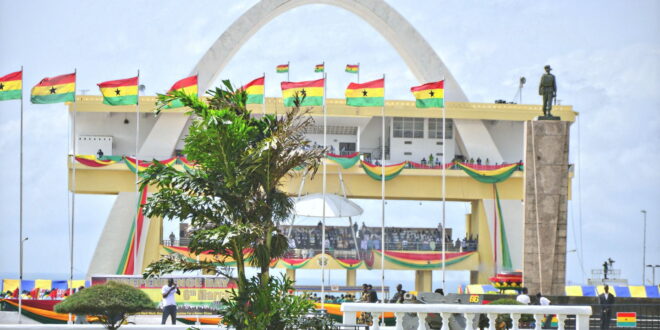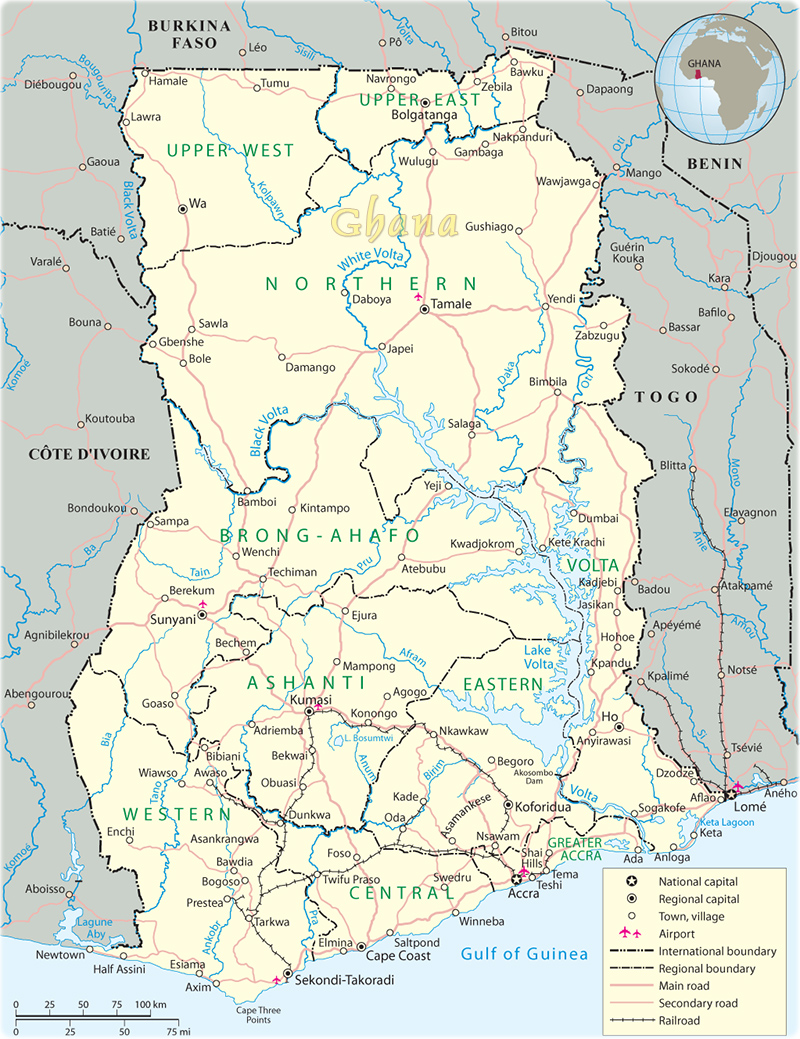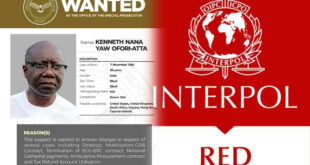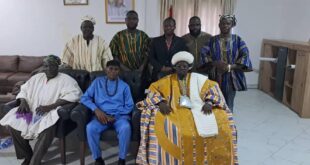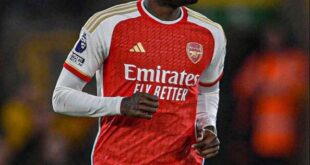Ghana was named after an ancient empire which boasted significant power, wealth and territory. It was called the Ghana empire. The name was adopted at independence because it was believed that the people inhabiting the Gold Coast had a historical connection with the Ghana empire.
The first person to make this suggestion was Rev. J. B. Anaman in his book, The Gold Coast Guide published in 1895. Next and building on this was Lady Luggard, wife of the infamous Lord Luggard who spearheaded what came to be known as indirect rule. Luggard’s book, “A Tropical Dependency” also included the stories of the empires of Mali and Songhai and was used in Achimota in the 1920s.
At the time of his death, the legendary James Kwegir Aggrey was working on a major history thesis to establish the historical connection between the people of Gold Coast and not only Ghana empire, but Mali, Songhai, Egypt and Abyssinia. This was not published because he died before he could finish it.
Rev. W. T. Balmer who used to teach at Mfantsipim also wrote about this connection to Ghana empire in 1926.
These aroused the interest of J. B. Danquah who published his book, Akim-Abuakwa Handbook in 1928, two years after Balmer’s book and 33 years after J. B. Anaman first made the suggestion. However Danquah in his book proposed that the territory should be called “AKANLAND” instead of Gold Coast. This drew sharp criticism and he then suggested “AKAN-GA” as a replacement.
The newspaper, West Africa, again criticised this saying, “it appears Dr. Danquah’s view of nationhood does not extend to the non-Akan population of the Northern Territories”. Upon further deliberations, Danquah then suggested “NEW GHANA”.
Ghana is a rare noun and has baffled a lot of researches for a couple of times now. The present established fact suggests that Ghanaians migrated from North-West and a bit Eastward direction around the Niger-Congo River. It is believe that the name came from the then Gana Empire which was covering Sudan-Mali area.
Prior to colonialism the actual name for present Ghana is still not known. The best stance to argue this may be that Ghana then was not a national unit and however had no unique name. Major parts of the territory were controlled by the Ashantes.
History of Ghana
Medieval Ghana (4th – 13th Century): The Republic of Ghana is named after the medieval Ghana Empire of West Africa. The actual name of the Empire was Wagadugu. Ghana was the title of the kings who ruled the kingdom. It was controlled by Sundiata in 1240 AD, and absorbed into the larger Mali Empire. (Mali Empire reached its peak of success under Mansa Musa around 1307.)
Geographically, the old Ghana is 500 miles north of the present Ghana, and occupied the area between Rivers Senegal and Niger.
Some inhabitants of present Ghana had ancestors linked with the medieval Ghana. This can be traced down to the Mande and Voltaic peoeple of Northern Ghana–Mamprussi, Dagomba and the Gonja.
Anecdotal evidence connected the Akans to this great Empire. The evidence lies in names like Danso shared by the Akans of present Ghana and Mandikas of Senegal/Gambia who have strong links with the Empire.
In 1482, the Portuguese built a castle in Elmina. Their aim was to trade in gold, ivory and slaves. In 1481 King John II of Portugal sent Diego d’Azambuja to build this castle.
In 1598 the Dutch joined them, and built forts at Komenda and Kormantsil. In 1637 they captured the castle from the Portuguese and that of Axim in 1642 (Fort St Anthony). Other European traders joined in by the mid 18th century. These were the English, Danes and Swedes. The coastline were dotted by forts built by the Dutch, British and the Dane merchants. By the latter part of 19th century the Dutch and the British were the only traders left. And when the Dutch withdrew in 1874, Britain made the Gold Coast a crown colony.
By 1901 the Ashanti and the North were made a protectorate.
Britain and the Gold Coast. The first Britons arrived in the early 19th century as traders in Ghana. But with their close relationship with the coastal people especially the Fantes, the Ashantis became their enemies.
Economic and Social Development (Before 1957)
1874–Gold Mine in Wassa and Asante. Between 1946-1950 gold export rose from 6 million pounds to 9 million pounds.
Political Movements and Nationalism in Ghana (1945 – 1957)
The educated Ghanaians had always been in the fore-front of constructive movements. Names that come into mind are –Dr Aggrey, George Ferguson, John Mensah Sarbah. Others like king Ghartey IV of Winneba, Otumfuo Osei Agyeman Prempeh I raised the political consciousness of their subjects. However, movements towards political freedom started soon after WWII.
This happened because suddenly people realised the colonisation was a form of oppression, similar to the oppression they have just fought against. The war veterans had become radical. The myth surrounding the whiteman has been broken. The rulers were considered economic cheats, their arogance had become very offensive. They had the ruling class attitude, and some of the young District Commissioner (DC) treated the old chiefs as if they were their subjects. Local pay was bad. No good rural health or education policy. Up to 1950 the Govt Secondary schools in the country were 2, the rest were built by the missionaries.
There was also the rejection of African culture to some extent. Some external forces also contributed to this feeling. African- Americans such as Marcus Garvey and WE Du Bois raised strong Pan-African conscience.
In 1945 a conference was held in Manchester to promote Pan African ideas. This was attended by Nkrumah of Ghana, Azikwe of Nigeria and Wallace Johnson of Sierra Leone. The India and Pakistani independence catalysed this desire.
Sir Alan Burns constitution of 1946 provided new legislative council that was made of the Governor as the President, 6 government officials, 6 nominated members and 18 elected members.
The executive council was not responsible to the legislative council. They were only in advisory capacity, and the governor did not have to take notice.
These forces made Dr J.B. Danquah to form the United Gold Coast Conversion (UGCC) in 1947. Nkrumah was invited to be the General Secretary to this party. Other officers were George Grant (Paa Grant), Akuffo Addo, William Ofori Atta, Obetsebi Lamptey, Ako Agyei, and J Tsiboe. Their aim was Independence for Ghana. They rejected the Burns constitution.
Credit: GhanaWeb.com
Ghana which was known as Gold Coast was changed to Ghana after independence by Dr. Kwame Nkrumah and Dr. J. B. Danquah. According to authoritative sources, the name Ghana was adopted after thorough research into the history of Ghana dating way back as mentioned above. But some still doubt this fact and believe G.H.A.N.A means God Has Appointed Nkrumah Already or for Africa ; and sure he is now the father of Africa.
Those who adhere to the latter view debate that Nkrumah’s humanistic ideologies and ambition in a United Africa drove him to center himself forever. Further the “h” which is in Ghana suggests a clue to support this fact since Nkrumah and Danquah will not make a mistake to westernize the name from Gana to Ghana.
Those who believe Ghanaians descended from North-West which is in agreement with why our name was change from Gold Coast to Ghana say that the name Ghana has some similarities in certain cultures around Ghana. Some believe that Ghana is a compound word [Ga-na] which means “warrior king” which is a word derived from Ouagadougou. This will mean that Ghanaians are originally from Burkina Faso where we can find traces of such semantic phrase. Further they also believe that there are huge similarities in culture, history, language etc.
My purpose for writing this piece is to call for a more valuable and well researched work on how Ghana came about. All the history behind Ghana does not really make any serious sense and little references are provided. It seems closer to oral tradition than facts. I can argue this:
1. Rarely will one find in African languages “h” following the consonants “g” or “k” e.g “gh” or “kh” It’s only in Semitic rooted languages like Hebrew, Arabic, Persian etc. we find such in transliterations. If we are do disregard the latter fact then the name has some Arabic connotations. The only argument to refute this fact is to say that the word has had European redaction or it has evolved. For example, Ashanti. With the “h” every historian will know that the word has undergone through metamorphism. The name is actually Asante hence Asantehene. In the case of Ghana it is not possible since contemporary and conservative Pan-African scholars came up with that name. If we are to take Ghana as like Ya-Na or Na-Na then Ghana might originally be Ga-Na [Gana] other than that the “h” means a lot in rediscovering the meaning of Ghana.
2. The true established Ghanaians in the pre-colonial are the Akans and specifically the Bono’s. It is believed that the Bono’s have settled in this land as early as in the 11th and 16th Centuries. Ga people crept in later. Ewe people were then part of Togoland. Northerners joined in through tribal wars and national demarcation. The Akan language has its roots in Swahili and Arabic and has Hebrew semantics. In Hebrew, most of the words are the same as the Akan. In religion the Akans are close to the Hebrew religion. The God of Saturday which is Kwame Tweeduapon has to do with the Hebrew Sabbath and Creator. Moreover, research has shown that traces of the Kente cloth can be found only in the traditions of ancient Israel. Therefore, Akans might have come from Eastward direction to form part of the Niger-Congo River civilization. Bono people must have something to tell us.
3. I think Dr. Nkrumah and J. B. Danquah made inferences based on a biased historical point of view. The languages of Ghana can be divided into three based on similarities: Language spoken by Northeners, Ga and Akan. NOTE: Volta Region was carved from Togoland. When you study these languages critically, one may note that Ga has some close connection with the Akan both in rhythm and some vocabularies whiles languages of the North are far different. Even their language is not near Arabic. If Ga people are supposed to have descended down from Niger-Congo River, then they might have been descending to Ghana at a latter period.
4. Before colonialism history was coned in mythical stories, it however becomes difficult when one tries to establish the true roots especially among indigenous traditional Ghanaians. Even the supposed name Gana Empire has no obvious clue in our culture. But no matter how difficult it is, modern scholarship can help to discover the true history of Ghana and its name by doing a linguistic or semantic research.
5. If Ghana and certain parts of West Africa countries descended from the Niger-Congo River civilization, then the question is who came to this part first, Ouagadougou, la Cote d’Ivoire or Ghana? Questions like this should help us to rediscover the meaning of Ghana. The Akan language is recognized as one of the major Niger-Congo River civilization languages and yet has no etymological traces in Akan traditions.
6. What is the actual date that Gold Coast was changed to Ghana. Many say it was after our independence in 1957. But on the 6th March 1957 the name Ghana was mentioned by Nkrumah in his independence address. So when actually?
My presuppositions may be faulty but I do hereby challenge researchers and historians to get into the matter once more to unravel the true meaning of Ghana to the people of Ghana. If it is as supposed God Has Appointed Nkrumah Already or for Africa then let’s settle it there and officially accept it in our books. If we can’t find a substantially and solid historical foundation then it’s time we go back to Gold Coast! But believe me what we know to be Ghana is debatable.
Source: Mensah Francis – MyGhanaMedia.com
 MYGHANAMEDIA.COM Best Source Of Latest News
MYGHANAMEDIA.COM Best Source Of Latest News
